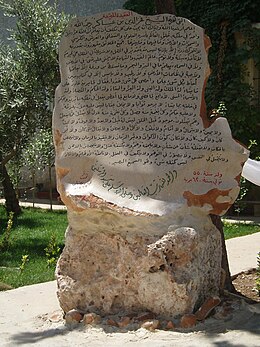Abu al-Walid al-Baji | |
|---|---|
| Personal | |
| Born | 403/1013[1] |
| Died | 474/1081[1] |
| Religion | Islam |
| Region | Al-Andalus |
| Denomination | Sunni Islam |
| Jurisprudence | Maliki |
| Creed | Ashari |
| Part of a series on |
| Ash'arism |
|---|
 |
| Background |
Abu al-Walid al-Baji, full name Sulayman ibn Khalaf ibn Saʿd (or Saʿdun) ibn Ayyub al-Qadi Abu al-Walid al-Tujaybi al-Andalusi al-Qurtubi al-Baji al-Tamimi al-Dhahabi al-Maliki (28 May 1013 – 21 December 1081), was a famous Mālikī scholar and poet from Beja in al-Andalus. He and Ibn Ḥazm were "the two most important literary figures in eleventh-century al-Andalus".[2]
Al-Baji was born in Beja on 28 May 1013 to a family from Badajoz. The family later relocated to Córdoba, where he received his primary education. At the age of 23, he went east to continue his studies. He remained there for thirteen years, three in Mecca studying under Abū Dharr al-Harawī. After a period in Baghdad under Abū l-Ṭayyib al-Ṭabarī and Abū Isḥāq al-Shīrāzī, he spent a year in Mosul under Abū Jaʿfar al Simnānī, possibly studying kalām. He may also have visited Aleppo, Damascus and Egypt. He returned home in 1047.[2] He worked at various times as a watchman and a goldsmith to support himself.
Al-Baji was thrust into the spotlight as soon as he had returned to al-Andalus. In a disputation in Majorca in 1048, he bested Ibn Ḥazm, leading to the latter's exile from the island. He spent time in Murcia, Dénia, Orihuela, Valencia and Lleida before settling in Zaragoza after the defeat of the crusade of Barbastro in 1065. His most productive years were those in Zaragoza under the patronage of Aḥmad al-Muqtadir.[2] He died in Almería on 21 December 1081.[3]